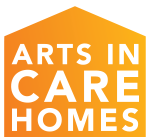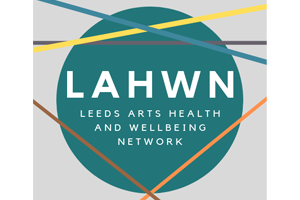
Leeds Arts Health and Wellbeing Network was launched in 2019 and we are delighted to be one of several networks across the UK bringing people together to increase the awareness of and opportunities for arts and health work.
We have written an in-depth news item for this year’s Arts in Care Homes Day talking through some of the projects over the last year with links to podcasts and films which we hope you find interesting.
Over the last year, we have had a part time project support officer join our network and our membership has grown to 550 people across arts and culture, health and care, research and universities and policy and decision makers. We also keep in touch with people developing work in creative ageing such as the Age of Creativity Network, the British Society of Gerontology and their Creative Ageing SIG to the National Sector Support Agency for Creative Ageing.
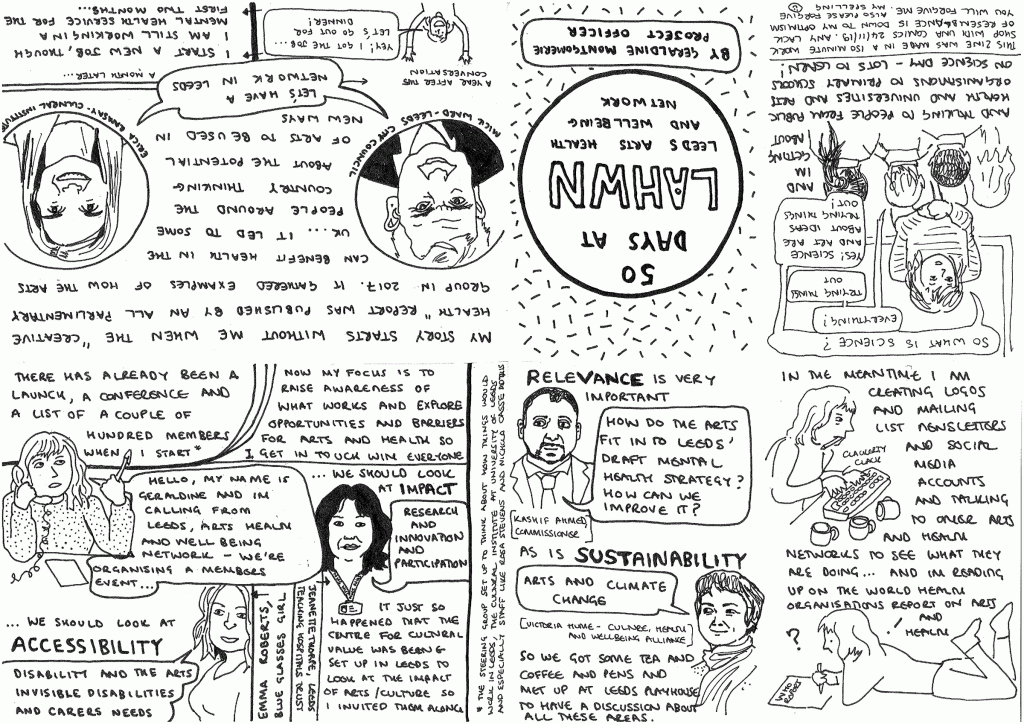
Since March we have been talking to care professionals and artists, including keeping in touch with our city’s Care Quality Team to share new activities and resources. From these conversations across Leeds, we have been learning a lot about how arts can benefit work in care homes such as reducing isolation and anxiety; using fine motor skills through creative activity; aiding communication, memory and concentration; improving balance and mobility and improving breathing. We have also learnt a lot about how activities can keep running during the pandemic.
Creative Communities: what we have been up to this year in Leeds
Following an invitation from Arts in Care Homes Day, our network wanted to share news on some recent arts in care homes activities in a bit more depth.
Leeds is working to be an Age Friendly City and over the last five years has been taking steps to link our health and care and our arts and culture sector through the work of the Time to Shine Programme through Leeds Older Peoples Forum, addressing social isolation, and the launch of Leeds Arts Health and Wellbeing Network in 2019.
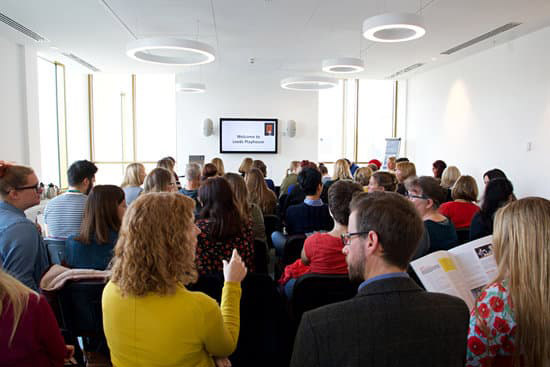
In March, the Network’s project officer, Geraldine, was invited to speak at a meeting of local Care Home Activity Co-ordinators and over the last six months she has kept in contact with both artists and care workers across our city as they have adjusted to the impact of the pandemic. We are particularly grateful to our Recovery Hub in East Leeds for sharing activities that have worked for their team over the last 6 months. Although there are many art forms and projects that may be of interest, we have focused on music and dance as well as using technology, working with creative artists and working together with older people and staff.
MUSIC: “I feel moved and tingly all over.”
[Harp Alignment participant]
In the East Leeds Recovery Hub residents have been most enthusiastic about live music. During the Covid-19 outbreak, Arts in Care Homes Day partner Live Music Now has helped link our care settings to available musicians, who have been willing to play outside the hub to minimise transmission risks. From acoustic guitarist, Simon (playing in a deluge) and Hannah (a classical singer, performing on VE day) to Jez (playing rock ‘n’ Roll favourites) these sessions have really been a highlight.
In the city, a new group of art and community-focused organisations that have come together to create Arts Together Leeds. In response to the challenges this year, they have created the Arts Together for Care Homes Project that started this summer with musicians and poets visiting different care settings and performing at a safe distance.
Within our network, freelance artists who are network members have been moving into care work this year to meet demands for front line staff. For example, local care home activity co-ordinator, Rebecca Penkett, is also a Harp Therapist and Singer at Harp Alignment who has played ‘Healing Music’ in over 190 care homes across the UK. She has found that residents that participated enjoyed singing along and found the music soothing, calming and relaxing. You can read reflections on the sessions from residents and care home staff here.
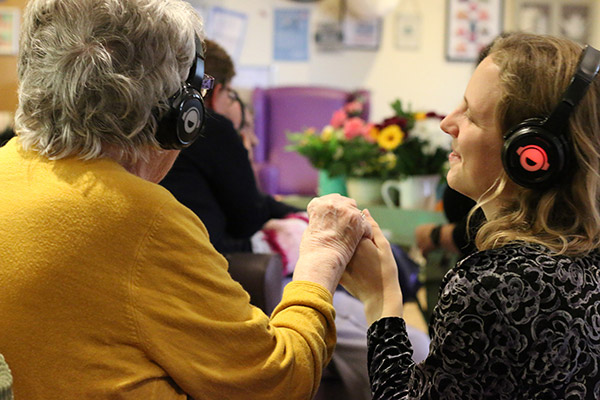
In the city new learning has been generated from music focused partnerships such as Stories from M&S Sheet Music; a collaboration between the M&S Company Archive, The Leeds International Piano Competition and complex needs day centres (Wykebeck Valley and Laurel Bank). Though the project was designed to explore a dormant collection of nearly 800 pieces of sheet music for the first time, through the use of the music the project was also found to have a significant benefit to participants in managing anxiety and improving engagement with an activity.
Robyn Dowlen, a research associate at Leeds’ Centre for Cultural Value, has just appeared on the Dementia Researcher podcast discussing the health benefits of music which you can listen to here. The podcast explored ways in which carers can facilitate engagement with music such as by including simple playlists that are unique to the individual into daily care plans. In the conversation, emphasis was also put on making more use of forms of music that reflect our culturally diverse communities.
If you would like to learn more about diverse music-related activities The Guardian newspaper just printed an article on the Hamari Yaadain dementia cafe and benefits of music for people living with dementia in South Asian communities in Leeds.
DANCE: “I think anything that you do that gives you movement helps long term, because you can’t just sit still and do nothing. It helps in all aspects of your life.”
[Yorkshire Dance participant]
Over three years as part of a wider programme called Time to Shine, local charity Yorkshire Dance is running In Mature Company, a project exploring the impact of music and dance on reducing loneliness for care home residents living with dementia that started at care homes The Grove and Halcyon Court. The project uses Dementia Care Mapping (DCM) as an evaluation tool to look at engagement levels of residents during the creative sessions (with control sessions before and after). The DCM reports recorded higher levels of mood and engagement during sessions, increased levels of social interaction between residents and touch occurred most frequently within 1:1 interactions between artists and residents. These touch moments were effective in building relationships and communicating non-verbally, thus increasing the resident’s feelings of wellbeing and comfort.
USING TECHNOLOGY: “It’s given us both an activity to do together using the games on it and listening to songs we used to listen to when we got married…” [100% Digital Programme participant]
[100% Digital Programme participant]
In the East Leeds Recovery Hub, through using of a projector and working with Leeds Libraries’ 100% Digital Programme which has created ways to promote digital inclusion such as a Tablet Lending Scheme, staff have been able to make more use of technology during the Covid-19 pandemic. Our city is excited to be building on this by delivering Virtual Reality Training in care settings this Autumn so that residents can use VR headsets.
With the projector, care staff have tended to put on particular videos – mainly vintage films of the local area and the popular by request BBC Four Britain On Film series and “Look at Life” of which there were over 500 films made. After putting on a film staff have often not announced it but rather allowed residents to come across the projector and sit down to watch if they like the look of the film… however a presentation of the Opera North musical ‘Trouble in Tahiti’ also went down well.
Whilst the unofficial ‘cinema’ has worked for people not isolating, for those that were, the biggest favourite was ‘lockdown bingo’. Which simply involves using a bingo machine, or Alexa and walking up and down corridors calling numbers into peoples’ rooms. The downside of this has been that this approach to bingo has been a bit of a sweaty activity for staff to do in warm weather and full PPE!
Care home staff have also found having an Alexa has enabled residents isolating for 10 to 14 days to say things like “I want to play some Bing Crosby” and gradually create their own personalised playlists at their own speed. Tablets have been popular for listening to and watching but also for online jigsaws. For example, you can find images from Leeds University Library Galleries on Jigsaw Planet.
If you are inspired by the music activities described above you can make a playlist easily with the BBC Music Memories Website, which has a selection of popular international music. You can try dance online, for example through Dance On – a Yorkshire Dance project for over 55s with an inspiring choice of online videos to get involved in whether seated or standing.
If you are looking for information online to spark conversations, the M&S archives have been developing activities for older people and those with dementia with a collection well-suited both for reminiscence and inspiring creativity. You can browse their website for themes to discuss here. They are currently closed to the public – but last year Simon Marks Court care home and arts organisation Skippko worked together with the company archive on a Sparking Memories Project – you can see a short film here of how the collaboration worked and what came out of it. You can also find collections from Leeds Museums and the North Ballet on Google Arts and Culture. Finally, Leeds’ Pyramid of Arts, who provide opportunities for people with learning disabilities to get involved in creative projects (such as their Legends group for older artists) have developed for arts activities to try at home called Pyramid Post.
WORKING WITH CREATIVE ARTISTS: “You’ve got people involved who never do activities.” [Artlink West Yorkshire participant]
[Artlink West Yorkshire participant]
Staff from East Leeds Recovery Hub joined with different care services working with complex needs, local museums and local musicians and artists over the last year, coming together for a Musical Mosaics project. Inspired by our cities’ Discovery museum collection and live music, care home residents have worked to develop mosaic pieces with local artist, Paul Digby. Unfortunately, the planned session at the Recovery Hub has not run as planned but four mosaics have been completed and we are looking forward to displaying these in public.
Across four care settings (Home Lea, Dolphin Manor, Knowle Manor and Spring Gardens) Art Link West Yorkshire have run a 15-week programme “We are All Artists”. The ambition was to introduce a wide range of creative activities and inspiring artwork and support residents to use their imaginations. You can watch a video on this work and the impact it has had here.
WORKING TOGETHER: “I want to … concentrate on the relationship between us all and our shared knowledge and experience.”
Care home activity co-ordinators tell us how talented their residents are and have shared with us videos of all kinds of abilities from steel pan players to watercolour painters so sometimes it is actually residents that take the lead on arts and music activities. Over the last year in Leeds older people have been key to many arts and culture events. Inkwell Arts ran Creative Age workshops for artists over 50 which culminated in a striking exhibition – Later – aiming to celebrate the advantages of ageing. Through Yorkshire Dance 100 people over 50 years old were taught a new dance work, Beige, which was performed in a huge shopping centre in a flash mob performances.
As part of developing a play called Maggie May, that explores experiences of dementia, Leeds Playhouse consulted with people living with this condition and ended up reflecting their experiences including the unexpected positive moments. Leeds also has a theatre company, Performance Ensemble, where the performers are all over 60 and their aim is to make art with the experience of age. You can listen to Alan Lyddiard who runs Performance Ensemble in his latest podcast talk about older people and the arts here.
At Oak Tree Lodge Care home, a pop-up theatre group called Fragments Leeds met with staff and residents to identify what they could bring to the care setting. Together they created an indoor ‘park’ which came complete with trees, a bandstand and a fountain. The ‘park’ included an immersive 24-hour loop of outdoor sounds for both night and day, smells associated with outdoors such as pine diffused through the room and a programme of activities including story-telling, classical music, massage and movement. You can listen to a podcast with Lily Craig who has worked on this and other projects in care homes here.
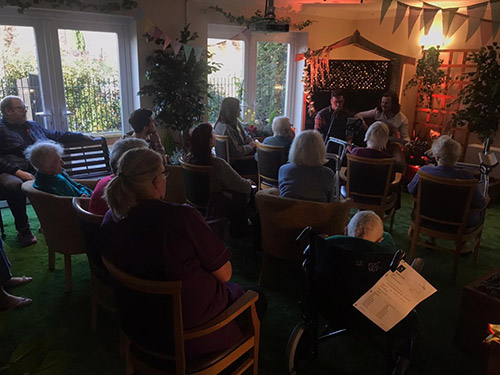
Fully involving everyone that might be affected by running arts activities (such as residents, care home staff, artists and visitors) can be hard work but co-production itself can also be valuable as a problem-solving activity that brings people together, requiring us to think creatively.
Although this is not a complete picture of all the work happening across our city, we hope that through the examples we have shared you will find useful ideas and projects that interest and inspire you. As a city, and in Leeds Arts Health and Wellbeing Network, we are always learning from the work of others and feel there is much we can do through arts and creativity to create spaces where people can age well. There has been lots of research on how arts can benefit health and what works in a care home setting that we can look to in planning new activities. We welcome anyone interested in our work in Leeds to follow us on social media or if you are interested in working with our network please consider joining Leeds Arts Health and Wellbeing Network as a member.
Written by Geraldine Montgomerie, Project Support Officer, with intern, Naomi Momoh, at Leeds Arts Health and Wellbeing Network in September 2020
We are very grateful to all the organisations we have described above for their generosity in sharing this information and especially to Bridget Campbell, Senior Support Worker working with Leeds Older People’s Services, Mental Health & Physical Impairment at East Leeds Recovery Hub.
